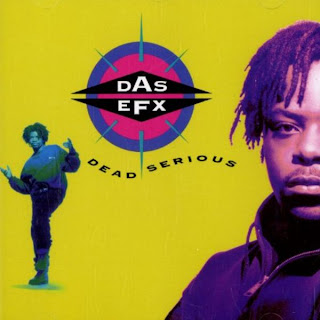"One for the money, two for the show/Thunder, Thunder, Thundercats HOO!/Yep, I got my mom, I got my girl, I got my friends/in the States I'm makin' dollars, in Japan I'm makin' yens"Where can we possibly begin with these two bamboozling bozos? It's impossible to pick a place that's really vital to point out for detailing their successes and weaknesses, but frankly, their effect is consistently understated; the dynamic duo of Skoob (aka Books, aka William "Willie" Hines) and Dre (aka Krazy Drazy, real alias Andre Weston) influenced a tight-knit number of young but important MCs with their tour-de-force 1991 freshman release Dead Serious. I suppose I could dive right into the rhetoric, giving a homage to the kids whose odes rang out from Brooklyn to T-Neck, a collective whose style helped solidify the stronghold grip Eric Sermon and Parrish Smith established upon the late 80s-early 90s hip-hop scene. But EPMD didn't hustle Das EFX into the limelight on the coattails of their own fame - no, the sewa-side children dominated the charts, obliterated the singles, and crashed the lyrical parties of other artists purely on one singularly powerful merit.
They were incredibly unique.
In a era where rappers like L.L. Cool J scrambled together tedious love ballads to woo female appreciation and consequentially higher sales numbers into the fold, Das EFX actively harangued bimbos with "Looseys" and generally regarded women of unsteady demeanor with just what they deserved, skepticism. In an era where Public Enemy tackled incredibly seriously issues regarding crack-cocaine usage and shot verbal bullets through the craniums of their enemies, actual or perceived, Das EFX penned odes to bad bouts of diarrhea. In an era that hailed "realness" and foretold the rise of gangsta rappers, Das EFX compared their money-making abilities to the quantity of Wonder bread circulating in American homes. Rhythmically erratic, in every other verse Skoob or his cohort slow down, or quicken, or blast away full throttle to match the spaces of funktastic beats provided to them, superimposing their vocals with an unnaturally groovy synergy. Throwbacks are consistent, metaphors liberally applied, referencing popular culture with an acute confidence that prevents their lyrics from becoming cliched or bland, even after fifteen hundred listens.
But they didn't only innovate when it came down to the content and structure of their lyrics; the vernacular word played a large part in their most appealing rhymes and limericks. Sputter out the words "I riggedy-rock the copacabana/Banana, split!" followed by hocking up a loogie will, in most instances, only garner you awkward stares; but in most instances lines such as these engraved the boys from the sewer into the annals of history a bit above their preferred lyrical abode. It also grabbed the attention of some individuals overeager to catapult themselves to record-breaking heights. Who could have thought that an addition of "iggedy" in Das EFX's stuttering, spastic wordplay across a mere ten songs would revolution the hip-hop game in such a sweeping fashion? MCs like Common, Jay-Z and the Lords of the Underground instantly snatched up the Sewa-Side boys' manner of expression, and leaned upon its characteristics so much in the upswing of their careers that, eventually, the duo were forced to let the style go, like parents releasing their children into the embrace of the world.
And it was hard on them. Das EFX annihilated competition in the "absolutely bizarrely appealing to most" category; unfortunately, they didn't do so well with diversification. The astounding burst of popularity launching their first release into the stratosphere didn't follow up on their second album, or their third, or their fourth; now they exist only as a fringe element, stuck in an unfortunate twilight all-too familiar with one hit wonders. However, to think this diminishes their importance in the world of hip-hop is absurd. Their lines stay slicked to the underbelly of unique rap, providing the foundation for a multitude of individuals surging in after them and, for the observant listener, still providing enjoyment relevant even to today.
Such is the legacy of just some men who're on the mic.
SNORE-DE-BLISS' NOTE:
What's good everybody? This is the first of an installment of reviews on old-school hip-hop albums and my take on 'em for you all to see. All these opinions are subjective, but that doesn't mean they're any less right than some stupid bullshit pumped out by the New York Times, right? But that won't be all for my loyal viewers - I'll also be postin' a bit of shit about my own personal day, and highlighting anything I find interesting at all. So if you're a man (or woman, know some of you ladies out there love hip-hop) who takes the greatest interest in the most asinine drivel, check in every day! If not, Fridays and Sundays are usually when I'll be postin' up some EXQUISITE WORDS for you to enjoy!
EXXXQUISITE!!! With three XXXs! You just gotta tune in!
P.S. Couldn't really sleep right now, 'swhy I banged out the review. Stupid flu, ravaging me like a typhoon against some thin trees.

No comments:
Post a Comment